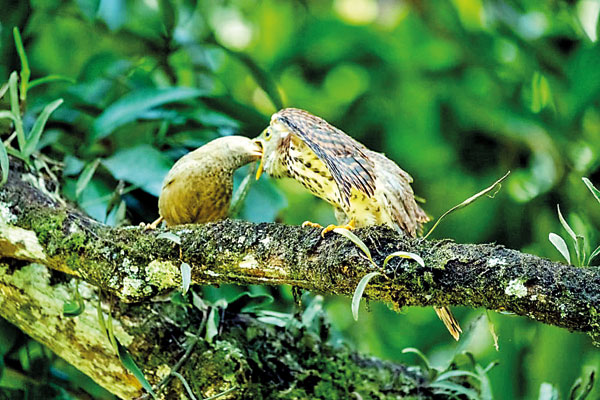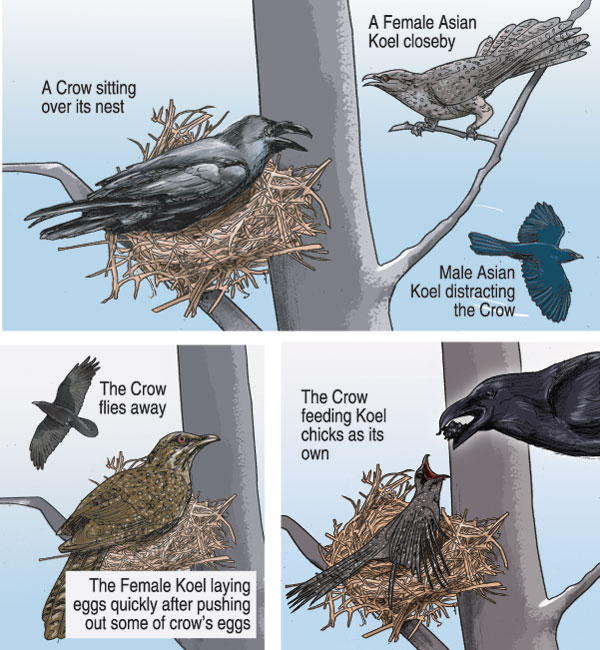News
Birds that find foster parents to raise their kids
View(s):By Malaka Rodrigo
During an early April visit to the Peradeniya Royal Botanical Garden, Dr. Ruwan Perera, a bird enthusiast, spotted a young Common Hawk Cuckoo perched on a branch. Capturing several photographs, he was surprised to see a Yellow-billed Babbler approach the young Hawk Cuckoo and feed it, despite the latter being larger in size. Yellow-billed Babblers, commonly known as “demalichcha,” live in groups. Dr. Perera, speaking to the Sunday Times, said that other birds in the babbler group also feed the Hawk Cuckoo, despite the obvious differences.

Birds that find foster parents to raise their kids
While some might interpret this as babblers caring for a lost cuckoo offspring, the reality is that this bird emerged from an egg laid by the mother Hawk Cuckoo in the babbler nest. The babbler parents are deceived into adopting the baby Hawk Cuckoo as one of their own.
“This phenomenon known as brood parasitism is quite common among birds in the Cuckoo family,” said Prof. Sampath Senevirathne, an ornithologist at the University of Colombo.
Brood parasitic birds choose to lay their eggs in the nests of other birds, relinquishing parental duties of raising their offspring. The unsuspecting surrogate parents incubate, hatch, and raise the changeling eggs to maturity, driven by the instinct to care for the young emerging in their nests.
This strategy gives the parasitic parents more time to forage and produce additional offspring. Spreading eggs across different nests reduces the risk of losing an entire brood to a predator attack, Prof. Senevirathne noted. Many species of cuckoos are brood parasites, with the Asian Koel or Koha being the most notable example in Sri Lanka.
Brood parents employ various strategies. One method involves matching the colour and texture of their eggs to those of the host’s eggs. Some cuckoos even remove a few eggs from the host’s nest to eliminate any suspicion.
In most cases, the offspring of brood parasites are more social than the host’s chicks, enabling them to monopolise the food brought by the parents and grow rapidly. However, in the case of the Koha, which lays eggs in crow nests, they coexist with the host’s offspring, says Dr. Jagath Gunawardana who has studied this bird’s behaviour over several decades.
Various parasitic species employ different techniques to achieve the task of approaching the host’s nest, with the Asian Koel often using a distraction strategy. (see graphic)

Professor Enoka Kudavidanage, Head of the Department of Natural Resources at Sabaragamuwa University said that back in 2020 he had the opportunity of observing a case of brood parasitism where two baby Pied cuckoos were cared for by the babbler family. Prof. Kudavidanage said that the birds exhibited behaviour mimicking that of the juvenile babblers.
Although the call of the Pied cuckoo is recognizable, it was somewhat toned down to mimic the babblers’ call. When it came to feeding, the larger Pied cuckoo even attempted to steal food, possibly a habit acquired through instinct, according to Prof. Kudavidanage.
The best way to say that you found the home of your dreams is by finding it on Hitad.lk. We have listings for apartments for sale or rent in Sri Lanka, no matter what locale you're looking for! Whether you live in Colombo, Galle, Kandy, Matara, Jaffna and more - we've got them all!

